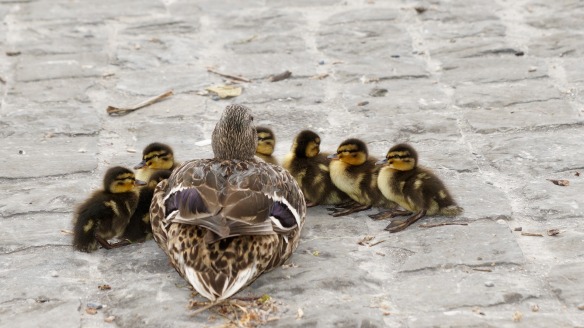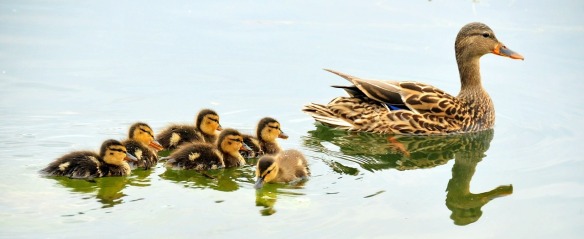A funny thing happened on my way home yesterday. I was in a rush, as Jim and I had a retirement party to attend that afternoon, and I had to get home to change clothes first and meet him.
I was driving uphill and approaching a corner. Suddenly there was a mallard duck mama leading a flotilla of tiny ducklings down the sidewalk. They looked to be only a couple of days old. A few of the ducklings walked into the gutter. Afraid they’d run in front of the car, I stopped. A short woman with a long dark braid herded them back to the sidewalk. I rolled down the window. She said, “We need to pick them up so they don’t get run over.”
“I have a pond,” I offered spontaneously.
“Do you want to take them?” she asked, then ran after them down the street.
I pulled around the corner and parked, then followed the woman and ducks back down, where they continued their walk toward town.

Several more women joined us. “Maybe we should take them to the turtle pond,” offered one of them. She was referring to a large pond with turtles, koi, and yes, sometimes, ducks, at a downtown park. The woman with the braid said, “You know how this usually goes: ducks hatch at the park, and at night the raccoons come in and eat every one.”
Which would happen at my house too, I supposed, so I didn’t offer my pond again.
“I think we should take them to the Cat and Bird clinic,” the braided woman said. “They’ll send them to wildlife rescue, where they will take care of them and release them later into the wild.”
We all seemed to collectively agree. Who wouldn’t want to help ducklings? Meanwhile the birds had crossed the street, and were running on a cement path leading into a small blue apartment building. A young blonde woman opened the trunk of her car, looking for a container to house the ducks. She had a cardboard box full of children’s books. “I’m a teacher,” she said.
“Then ‘Make way for Ducklings,’” I said, referring to the Robert McCloskey book by that name. It’s a book every child read when I was small, but this teacher looked young enough that she might not know of it. But she laughed, so maybe she did know.
I helped her unload the books. The carton looked like it would hold the ducklings, but not the mother – not tall enough. “Can I take that grocery bag?” I asked, thinking we could house the mother in it temporarily – if we could catch her.
We ran over to the apartment building where the other women – there were five or six of us now – were trying to catch the ducklings. A couple were watching from the sidewalk. “You shouldn’t do that. If you touch the babies, the mother won’t take care of them,” the man said.” I’d heard this before but had just finished reading a book about owls, and the author, a biologist, said that wasn’t true; it was one of those urban myths. I told him what I’d just read. He looked dubious. We proceeded anyway.
The ducklings had gotten themselves in a corner where they couldn’t climb the steps. I scooped up three or four of them; others got the rest. All but one duckling and the mother were in the box, cheeping madly.
The mother duck and the free duckling managed to get under a hedge and into another neighbor’s yard. After more efforts, finally the last duckling was caught.
And then a surprising thing happened.
The mother duck flew. When the ducklings were on the ground, she’d stayed with them to protect them; but all of them were now captives. She flew, circling the block, calling to them. They called back. It was awful. We had separated a mother and her babies. What in the name of protection and meddling had we done?
And then, I had to go. I’d left my phone in the car, but I could feel that twenty or thirty minutes had passed, and I couldn’t stay to watch the end of this.
I turned up my hands. “I have an appointment,” I explained to the braided woman.
She just shrugged. As I left, an athletic looking woman with short blonde hair, not the teacher, but another who had joined our little band said, “I think we should open the box, back away, and see if the mother will land near her babies.”
Which at least gave me hope. But I drove away with a very uneasy feeling.
That very morning, I’d been talking with a group of women about the female desire to nurture and tend. In this duckling-saving scenario, several women who didn’t know one another had all joined together in the moment, as if we had a collective will to get these ducks to safety. But did we do them a good turn? Was it necessary? Did any of us know enough about these wild things?
Perhaps the mother duck would have led her ducklings straight into town towards the park with the pond. She just might have stopped traffic wherever she went. Perhaps she even knew the ponds’ location. After all, a pair of mallard ducks comes to our home every spring: every spring for the last ten years. The first year they landed in our newly built, still uncovered swimming pool, and stayed for several days. Last year they brought a friend: there were two males and a female. We have two small ponds on our property, and the ducks use both of them. This year they only stayed for two days. They always seem quite at home.
I don’t know if I am seeing the same ducks from year to year, but their lifespan is twenty years, so it could be. Or maybe the original ducks told their flock and their ducklings about the water on this property. Maybe we are seeing a family migration.
When I got home, I told two of our employees, Doris and Socorro, what had just happened with the ducks. To my surprise Socorro said, “The same thing happened to us last week as we were leaving your driveway. A mother duck and her babies were running down the street!”
And wisely, they had chosen not to do anything about it.

